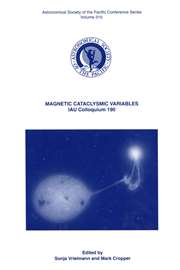No CrossRef data available.
Article contents
Experiments in Differential Speckle Interferometry
Published online by Cambridge University Press: 12 April 2016
Abstract
We propose to develop a technique to achieve submillisecond of arc resolution on stellar objects. It uses the fact that the spectrum of the light emitted by such an object often changes across its surface either because of Doppler shifts, Zeeman splitting, abundance anomalies or changes in the stellar atmosphere. By an appropriately designed experiment using narrow band (0.5 – 1 Å) filters, it is then possible to obtain differences between the position of speckles in the stellar image when viewed in slightly different wavelengths. It is possible to determine these differences in the position of the speckles with an accuracy much higher than the speckle size itself using techniques which are already developed for binary star-speckle research. We propose to use the technique of “Differential Speckle Interferometry” to study stellar rotation, evolution of stellar systems, spectroscopic binaries, the mass-luminosity relation, and peculiar A stars.
- Type
- Session III: Interferometry
- Information
- Copyright
- Copyright © Reidel 1982


